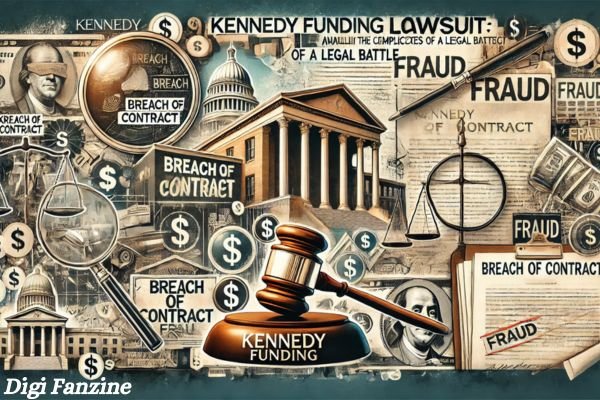The “Kennedy Funding lawsuit” is a significant legal dispute involving Kennedy Funding, a well-known private lender in the commercial real estate sector. This lawsuit has garnered considerable attention due to its impact on the financial industry and its implications for borrowers and lenders alike. In this article, we will explore the “Kennedy Funding lawsuit” in detail, examining the key issues, legal arguments, and the broader ramifications for stakeholders. Digi Fanzine provides a comprehensive overview of the case, shedding light on the complex nature of such financial disputes.
What is the Kennedy Funding Lawsuit?
The “Kennedy Funding lawsuit” centers around allegations of misconduct and unfair practices by Kennedy Funding. The lawsuit claims that Kennedy Funding engaged in predatory lending practices, providing loans under conditions that were deemed unfavorable and unreasonable for borrowers. This case has brought to light critical concerns about transparency, fairness, and regulatory compliance in the private lending sector. As reported by Digi Fanzine, the lawsuit aims to address these alleged malpractices and seek justice for affected borrowers.
Key Allegations in the Kennedy Funding Lawsuit
The primary allegations in the “Kennedy Funding lawsuit” revolve around several key areas of concern. First, there are claims that Kennedy Funding imposed exorbitant interest rates and hidden fees on borrowers, leading to financial strain and potential default. Additionally, the lawsuit alleges that Kennedy Funding provided loans with unrealistic terms and conditions, making it nearly impossible for borrowers to meet their obligations. Such practices have raised questions about the ethical standards of private lenders and their responsibilities toward borrowers.
Legal Proceedings and Developments in the Kennedy Funding Lawsuit
The “Kennedy Funding lawsuit” has seen numerous legal proceedings since its inception, with both parties presenting their arguments and evidence. Kennedy Funding has denied all allegations, arguing that their lending practices comply with industry standards and regulatory requirements. Meanwhile, the plaintiffs continue to push for a resolution that addresses the financial damages they claim to have suffered. As covered by Digi Fanzine, the case has moved through various courts, with each development adding new layers of complexity to the legal battle.
Implications of the Kennedy Funding Lawsuit for Borrowers and Lenders
The outcome of the “Kennedy Funding lawsuit” could have far-reaching implications for both borrowers and lenders in the commercial real estate sector. If the court rules in favor of the plaintiffs, it could set a precedent for greater scrutiny of private lending practices, prompting lenders to adopt more transparent and fair policies. Conversely, a ruling in favor of Kennedy Funding might reinforce the status quo, allowing private lenders to continue their current practices with minimal changes. Digi Fanzine notes that this lawsuit could significantly influence the regulatory landscape for private lending.
How the Kennedy Funding Lawsuit Impacts the Real Estate Market
The “Kennedy Funding lawsuit” also has potential consequences for the broader real estate market. The allegations of predatory lending practices have raised concerns among investors and stakeholders, leading to increased caution in the market. If the lawsuit results in stricter regulations, it could affect the availability and cost of financing for commercial real estate projects. As highlighted by Digi Fanzine, these changes could alter investment strategies, with potential impacts on property values, development timelines, and overall market dynamics.
Reactions from Industry Experts on the Kennedy Funding Lawsuit
Industry experts have expressed varied opinions on the “Kennedy Funding lawsuit.” Some believe that the lawsuit is a necessary step toward ensuring greater accountability and fairness in private lending. They argue that increased scrutiny could protect borrowers from exploitative practices and promote healthier market dynamics. Others, however, caution that overly stringent regulations could stifle innovation and reduce the availability of credit for high-risk ventures. Digi Fanzine has gathered insights from both sides, providing a balanced perspective on the potential outcomes of this lawsuit.
The Future of Private Lending in Light of the Kennedy Funding Lawsuit
The “Kennedy Funding lawsuit” is likely to have a lasting impact on the future of private lending. If the lawsuit results in significant penalties for Kennedy Funding, it may deter other private lenders from engaging in similar practices. This could lead to a more cautious approach in the industry, with lenders prioritizing transparency and compliance. Alternatively, if Kennedy Funding successfully defends its practices, it may embolden other lenders to maintain their current operations. Digi Fanzine suggests that the outcome of this lawsuit will shape the private lending landscape for years to come.
Conclusion: What’s Next for the Kennedy Funding Lawsuit?
As the “Kennedy Funding lawsuit” continues to unfold, all eyes are on the legal proceedings and the potential implications for the industry. Both borrowers and lenders are keenly watching for any signs of a precedent that could change how private lending operates. The lawsuit highlights the need for greater transparency, fairness, and accountability in financial dealings, particularly in the high-stakes world of commercial real estate. As Digi Fanzine concludes, the resolution of this case will likely provide valuable lessons and guidance for all parties involved.
